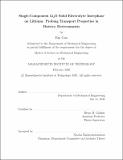Single-component Li₂O solid electrolyte interphase on lithium : probing transport properties in battery environments
Author(s)
Guo, Rui(mechanical engineer)Massachusetts Institute of Technology.
Download1199334608-MIT.pdf (5.084Mb)
Other Contributors
Massachusetts Institute of Technology. Department of Mechanical Engineering.
Advisor
Betar M. Gallant.
Terms of use
Metadata
Show full item recordAbstract
Lithium (Li) anodes suffer numerous challenges arising from the chemically inhomogeneous nature of the native solid electrolyte interphase (SEI), which impedes smooth Li plating and leads to dendrite growth. In spite of much attention paid to engineering Li interfaces of late, there is still limited understanding of the desired chemical composition of an improved Li SEI. One major challenge has been a lack of empirical data on the structure-property-performance relations in individual SEI phases, and specifically those present at a metallic Li interface, where the chemical potential imposed by Li will yield different material properties than bulk analogues that are typically invoked to understand SEI behavior. Herein, we report preparation of single-component SEIs of lithium oxide (Li₂O) grown ex situ directly onto Li foils by controlled metal-gas reactions, generating 'deconstructed' model interfaces with nanoscale thickness (20-100 nm) similar to the native, yet more complex multiphasic SEI. The model Li/Li₂O electrodes serve as a platform for further chemical and electrochemical characterization. In particular, electrochemical impedance spectroscopy, combined with interface modeling, is used to extract transport properties (ionic conductivity, diffusivity, charge carrier concentration and activation energy barriers) of Li/Li₂O in symmetric cells with EC/DEC electrolyte. The Li₂O SEI is further studied as a function of synthesis condition, revealing microstructural sensitivities that can be tuned to modulate transport behaviors. Finally, results are compared with similarly deconstructed Li/LiF interfaces synthesized herein through an alternative metal-gas reaction, as well as with the native Li SEI, to isolate chemistry- and structure-specific differences.
Description
This electronic version was submitted by the student author. The certified thesis is available in the Institute Archives and Special Collections. Thesis: S.M., Massachusetts Institute of Technology, Department of Mechanical Engineering, 2020 Cataloged from student-submitted PDF of thesis. Includes bibliographical references (pages 59-63).
Date issued
2020Department
Massachusetts Institute of Technology. Department of Mechanical EngineeringPublisher
Massachusetts Institute of Technology
Keywords
Mechanical Engineering.